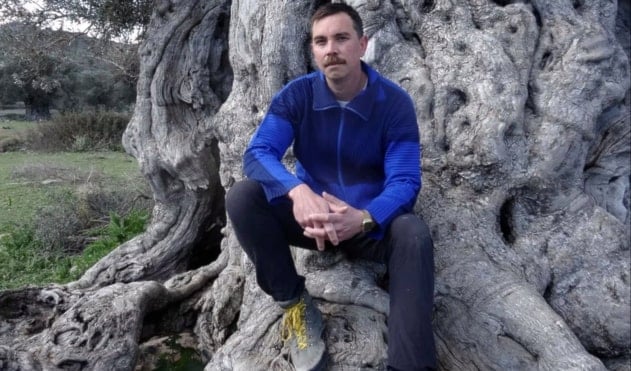German foundation withdraws award from UK artist over support for BDS
The incident has sparked criticism, with critics arguing that it reflects Germany's escalating hostility toward criticism of "Israel’s" human rights record and its actions in Gaza.
-

UK artist James Bridle is seen here in a photo procured from his website. (jamesbridle.com)
The German Schelling Architecture Foundation has reportedly withdrawn a prestigious architecture award from British artist James Bridle due to his support for the Boycott, Divestment, and Sanctions (BDS) movement against "Israel" amid its ongoing genocide in Gaza and current aggression on Lebanon.
Bridle had signed an open letter in October advocating for a cultural boycott of Israeli institutions. Critics warn that this move highlights Germany's increasing intolerance toward criticism of "Israel’s" human rights violations and atrocities most notably in Gaza.
Addressing the controversy, Bridle emphasized the responsibility of institutions to uphold ethical standards. In an opinion piece titled "The Denial of Genocide Is on the March Everywhere," published in Art Review on Tuesday, Bridle reflected on the growing challenges of holding institutions accountable in the face of global injustices.
Dive deeper
Recently, the German Bundestag passed a resolution aimed at addressing the alleged rise in "antisemitic" incidents across the country. Proposed after the beginning of the ongoing genocide against Palestinians in Gaza, the resolution followed intense debates among political parties and sparked significant controversy. Critics, including legal experts, civil society groups, and prominent Jewish intellectuals, opposed the measure.
The resolution ties public funding for cultural and scientific projects to compliance with the International Holocaust Remembrance Alliance (IHRA) Working Definition of Antisemitism. It states: “No organizations or projects that spread antisemitism, question Israel’s right to exist, call for a boycott of Israel, or actively support the Boycott, Divestment, Sanctions (BDS) movement shall receive financial support.”
"This week, I discovered the implications of this resolution," he wrote in his piece.
In his piece, Bridle explained that in May, the Schelling Architecture Foundation in Karlsruhe, Germany, informed him of their decision to award him the 2024 Prize for Architecture Theory. However, just days before the scheduled awards ceremony—and shortly after the public announcement of the award—the foundation contacted him to revoke the prize.
"The reason given was that I, alongside thousands of other writers, had signed an open letter pledging to boycott Israeli cultural institutions ‘that are complicit or have remained silent observers of the overwhelming oppression of Palestinians," he gushed.
"Germany is far from alone in this situation. The far right, and the denial of genocide that accompanies it, are on the march everywhere. But the logic of Strike Germany is simple: if it is illegal in Germany to call for cultural change in Israel, then it becomes necessary to call for cultural change in Germany itself. Late enough to be ashamed, but never too late, I sign my name," he concluded his piece by saying.
Not an isolated incident
After October 7, Germany has witnessed widespread pro-Palestinian protests, but authorities have imposed strict measures in response. Palestinian flags, pro-Palestinian speeches, and the iconic Koufiyyeh have been banned in many areas, with Berlin schools receiving official authorization to enforce the restrictions.
Reports of police violence against protesters have emerged in cities such as Frankfurt, Munich, and Berlin, where riot police were deployed for consecutive days, including in Sonnenallee, a focal point for demonstrations against the Israeli bombardment of Gaza.
Berlin, home to one of Europe’s largest Palestinian diaspora communities—estimated at 300,000—has become a center of both protest and repression. Cultural institutions have faced pressure to cancel events featuring groups critical of Israeli policies. In one prominent example, the Frankfurt Book Fair postponed an event honoring Palestinian author Adania Shibli for her novel A Minor Detail.
German authorities have justified these measures as efforts to prevent public disorder and combat "antisemitism".
Meanwhile, pro-Palestinian supporters argue that these actions represent a broader crackdown, criminalizing Palestinians and suppressing dissent. They assert this policy undermines the rights of entire communities and stifles voices opposing the Israeli atrocities in Gaza.
It is worth noting that Germany has long been a steadfast ally of "Israel" throughout all of its onslaughts, with officials frequently citing the country's historical responsibility due to its Nazi past. However, critics argue that the unconditional support for Israeli Prime Minister Benjamin Netanyahu's government is eroding Germany's credibility on the global stage and increasing its diplomatic isolation.

 4 Min Read
4 Min Read








